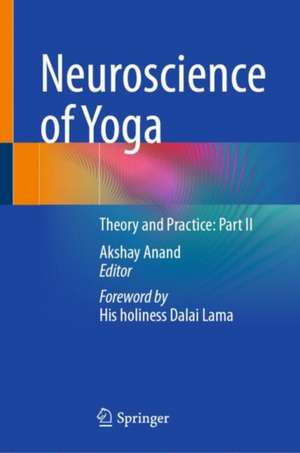Neuroscience of Yoga: Theory and Practice: Part II
Editat de Akshay Ananden Limba Engleză Hardback – 25 aug 2024
| Toate formatele și edițiile | Preț | Express |
|---|---|---|
| Hardback (2) | 898.26 lei 6-8 săpt. | |
| Springer Nature Singapore – 26 aug 2024 | 911.95 lei 3-5 săpt. | |
| Springer Nature Singapore – 25 aug 2024 | 898.26 lei 6-8 săpt. |
Preț: 898.26 lei
Preț vechi: 1095.44 lei
-18% Nou
Puncte Express: 1347
Preț estimativ în valută:
171.91€ • 178.81$ • 141.92£
171.91€ • 178.81$ • 141.92£
Carte tipărită la comandă
Livrare economică 15-29 aprilie
Preluare comenzi: 021 569.72.76
Specificații
ISBN-13: 9789819728541
ISBN-10: 9819728541
Pagini: 250
Ilustrații: Approx. 250 p. 40 illus., 20 illus. in color.
Dimensiuni: 155 x 235 x 24 mm
Greutate: 0.65 kg
Ediția:2024
Editura: Springer Nature Singapore
Colecția Springer
Locul publicării:Singapore, Singapore
ISBN-10: 9819728541
Pagini: 250
Ilustrații: Approx. 250 p. 40 illus., 20 illus. in color.
Dimensiuni: 155 x 235 x 24 mm
Greutate: 0.65 kg
Ediția:2024
Editura: Springer Nature Singapore
Colecția Springer
Locul publicării:Singapore, Singapore
Cuprins
Chapter 1 Yoga and mindfulness in the prevention of metabolic diseases.- Chapter 2 Yoga clinical trials for Neurological Disorders and Headache-Trends and advances.- Chapter 3 Neuroscience of Yoga for mood and cognitive disorders of aging.- Chapter 4 Yogic Interventions in clock dysfunction, neurodegeneration and ageing.- Chapter 5 Experimental Yoga protocols for Brain Diseases.- Chapter 6 Pain Neuroscience and the emerging use of Yogic techniques in management.- Chapter 7 The role of Mindfulness and Yoga in the management of Cancer.- Chapter 8 Role of Yoga in Primary and Secondary Prevention of Cardiovascular Diseases.- Chapter 9 Neuroscientific Perspective of School Based Yoga and Mindfulness Education.- Chapter 10 Neurophysiological basis of beneficial effects of Yoga on Health.- Chapter 11 Exploring relationship of Mind wandering and neuro-economics with Yoga.- Chapter 12 Knowledge, attitude, and gap in the practice of Yoga for public policy in brain health and integrative health.- Chapter 13 Evidence-based Research in Neuroscience of Yoga: Quality, Ethics, and Integrity Perspectives.- Chapter 14 Neurobiology of consciousness (from Neuroscience and Ancient perspective).- Chapter 15 Science and research on Yoga and spirituality.- Chapter 16 Significance of Animals in Yoga and Meditation.
Notă biografică
Dr. Akshay Anand is a professor at the Neuroscience Research Lab in the Department of Neurology, PGIMER, Chandigarh. He earlier served as Visiting Professor at the Kyoto University of Medicine and is currently distinguished Visiting Professor at S-VYASA, Bengaluru. He has also worked as visiting scientist at Lesya Ukrainian Eastern European National University, Lutsk, and Sri Sri Institute of Advanced Research in Bengaluru. He has mentored more than two dozen PhD students, faculty members and editorial colleagues and completed equal number of research grants and MPLADS grants and currently remains engaged in advising different editorial, policy, and scientific enterprises across 30 countries which include Journal start ups, Quality Assurance programs, academic social activities and bringing rigour to Neuroscience of Yoga. He has published more than 200 research papers as corresponding/first author in international peer-reviewed Journals besides filing 4 patient applications. This includes publications in Nature Medicine, 50 policy research commentaries, popular articles and wide electronic media coverages.
Dr. Anand has an h index of 36 with about 4800 citations and is the editor in chief of Annals of Neurosciences and Integrative Medicine Case Reports (JIMCR) and former EIC of Integrative Medicine International. He has received more than 20 national and international awards/honors for his exemplary work in advancing Neuroscience and Yoga research. He is also advisory board member at Centre for Consciousness, BIMDMC, Harvard University, Boston, USA. His academic and social activities, such as PM’s Clean India program and “Yoga Scholars PGIMER”,have cultivated an increased sense of preventive healthcare among his students, colleagues, and science practitioners.
Dr. Anand has an h index of 36 with about 4800 citations and is the editor in chief of Annals of Neurosciences and Integrative Medicine Case Reports (JIMCR) and former EIC of Integrative Medicine International. He has received more than 20 national and international awards/honors for his exemplary work in advancing Neuroscience and Yoga research. He is also advisory board member at Centre for Consciousness, BIMDMC, Harvard University, Boston, USA. His academic and social activities, such as PM’s Clean India program and “Yoga Scholars PGIMER”,have cultivated an increased sense of preventive healthcare among his students, colleagues, and science practitioners.
Textul de pe ultima copertă
This part of the book offers a multidimensional exploration of the neuroscience of yoga and in-depth insights into the neuroscientific underpinnings of yoga's impact on different disease conditions; explores the fascinating intersections between yoga, education, and neuroeconomics, as well as the relationship between yoga, spirituality, and consciousness; and acknowledges the importance of animal models in yoga research. In addition, the book addresses the concept of mind wandering and knowledge practice gap. This section provides valuable guidance for policymakers, healthcare professionals, and educators by exploring these aspects. Its comprehensive nature makes it an invaluable resource for researchers, practitioners, and individuals interested in unravelling the scientific complexities of the mind-body connection.
Caracteristici
Covers latest evidence from neuroimaging, biochemical and cellular effects of yoga on wellness Comprises top yoga biologists in the field of palliative care, cardiovascular and Brain health Provides special section containing future research designs by cell culture, animal models and technology
